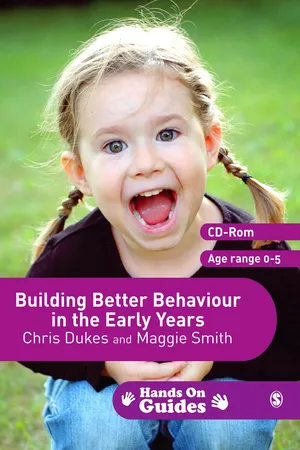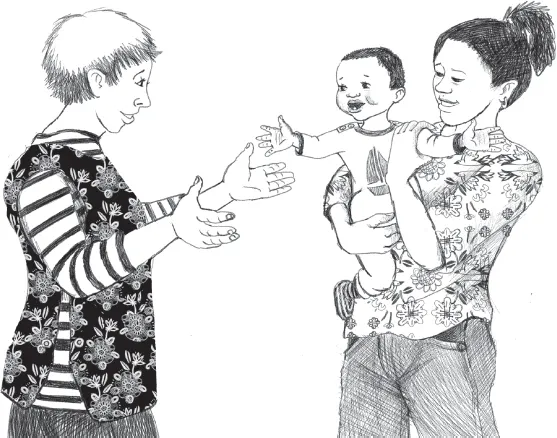
- 120 pages
- English
- ePUB (mobile friendly)
- Available on iOS & Android
Building Better Behaviour in the Early Years
About this book
By asking you to reflect on how the ethos, practice and general approach in your setting impacts on the behaviour of both children and adults, the book suggests sensible ways to achieve an exciting and stimulating environment for all
From an award-winning author team, there is down-to-earth advice, a number of common-sense solutions and all the essential information you will need to develop the best sort of setting, where everyone supports one another.
Chapters offer guidance on:
- creating an enabling environment for all
- developing a team-based approach
- considering the whole child
- working with parents and other professionals
- observing and assessing behaviour
- sharing good practice.
There are also:
- case studies of children between 0 to 5 years
- sample policies
- lots of photocopiable material, on the accompanying CD-Rom.
Suitable for all Early Years students and practitioners, the book is an encouraging read that will inspire and help you to improve behaviour in your class or setting.
Frequently asked questions
- Essential is ideal for learners and professionals who enjoy exploring a wide range of subjects. Access the Essential Library with 800,000+ trusted titles and best-sellers across business, personal growth, and the humanities. Includes unlimited reading time and Standard Read Aloud voice.
- Complete: Perfect for advanced learners and researchers needing full, unrestricted access. Unlock 1.4M+ books across hundreds of subjects, including academic and specialized titles. The Complete Plan also includes advanced features like Premium Read Aloud and Research Assistant.
Please note we cannot support devices running on iOS 13 and Android 7 or earlier. Learn more about using the app.
Information
| CHAPTER ONE | ||
| The bigger picture |
- The Early Years Foundation Stage – Statutory Framework (DfES, 2007)
- The Early Years Foundation Stage – Practice Guidance (DfES, 2008)
- The Code of Practice for Special Educational Needs (DfEE, 2001)
- The Disability Discrimination Act (NCB, 1995)
- a Hands-on activity
- Further reading.
The Statutory Framework for the EYFS
Welfare requirements
Safeguarding and promoting children’s welfare
Specific legal requirements
- any person who cares for, or who is in regular contact with children;
- any person living or working on the premises.
Statutory guidance to which providers must have regard
Practice Guidance for the EYFS
- A Unique Child
- Positive Relationships
- Enabling Environments
- Learning and Development.
- For children, being special to someone and well cared for is vital for their physical, social and emotional health and well-being.
- Being acknowledged and affirmed by important people in their lives leads to children gaining confidence and inner strength through secure attachments with these people.
- Exploration within close relationships leads to growth of self-assurance, promoting a sense of belonging which allows children to explore the world from a secure base.
- Children need adults to set a good example and to give them opportunities for interaction with others so that they can develop positive ideas about themselves and others.
- Children who are encouraged to feel free to express their ideas and their feelings, such as joy, sadness, frustration and fear, can develop strategies to cope with new, challenging or stressful situations.

When does behaviour become a special need?
The Special Educational Needs Code of Practice
- Every child with special educational needs should have their needs met.
- As far as possible these needs will be met within a mainstream setting with access to a broad, balanced and relevant curriculum.
- The views of parents should be sought and taken into account.
- Wherever possible the views of the child should be, taken into account.
- Communication and interaction
- Cognition and learning
- Behavioural, emotional and social development
- Sensory and physical.
| (a) | have a significantly greater difficulty than the majority of children of the same age; or |
| (b) | have a disability which prevents... |
Table of contents
- Cover Page
- Title Page
- Copyright Page
- Contents
- Acknowledgements
- About the Authors
- Contents of the CD-ROM
- Introduction
- Poem
- 1 The Bigger Picture
- 2 Development Matters
- 3 A Whole Child Approach
- 4 The Reflective Setting
- 5 A Strategy Bank
- 6 Observing Behaviour
- 7 A Skills Bank
- Contacts and Useful Organisations
- References
- Index

